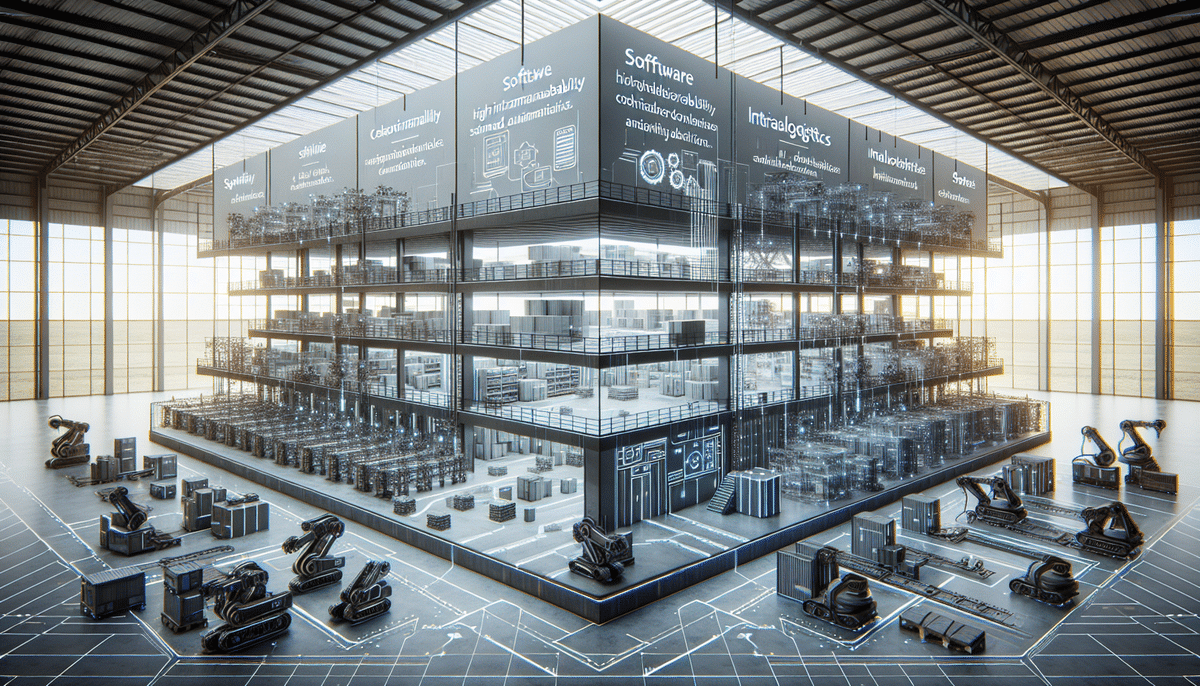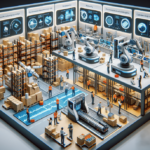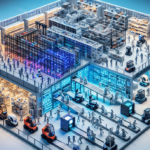Swisslog vs Fetch Robotics: A Comprehensive Comparison
Warehouse automation is a pivotal focus in the logistics industry, with companies striving to enhance efficiency, safety, and scalability. Two leading entities in this realm are Swisslog and Fetch Robotics. This article offers an in-depth comparison of these companies, examining their strengths, costs, impact on workplace safety and efficiency, and the integration of artificial intelligence in their systems. By the end, readers will have a clear understanding of which solution aligns best with their warehouse automation needs.
Company Overviews: Swisslog and Fetch Robotics
Swisslog
Swisslog specializes in robotics and automation solutions tailored for warehouses, distribution centers, and healthcare facilities. Established in 1900 in Switzerland, Swisslog boasts a global presence across over 20 countries with more than 2,500 employees. Their portfolio includes:
- Automated Storage and Retrieval Systems (AS/RS)
- Conveyor Systems
- Robotic Palletizing and Depalletizing Systems
- Warehouse Management and Control Software
These solutions aim to streamline operations, enhance efficiency, and reduce operational costs, making Swisslog a preferred choice for large-scale and complex warehouse environments.
Fetch Robotics
Fetch Robotics, founded in 2014 and based in the U.S., focuses on mobile robots and autonomous material handling solutions. Their offerings include:
- Autonomous Mobile Robots (AMRs)
- Autonomous Carts
- Integrated Hardware and Software Solutions
Fetch Robotics is dedicated to boosting productivity and efficiency while minimizing the need for human intervention in repetitive tasks, making them ideal for dynamic and rapidly evolving warehouse settings.
Comparing Features and Capabilities
To effectively compare Swisslog and Fetch Robotics, we assess their strengths and weaknesses in key areas:
Automated Storage and Retrieval Systems (AS/RS)
Swisslog leads in AS/RS solutions, offering systems like the Vectura stacker crane, CycloneCarrier shuttle system, and QuickMove conveyor system. These modular systems optimize storage space, enhance efficiency, and lower labor costs. According to a McKinsey report, AS/RS can increase warehouse efficiency by up to 25%.
Fetch Robotics does not provide traditional AS/RS solutions but offers AMRs designed for transportation tasks. These robots efficiently move items within a warehouse but are not intended for vertical storage and retrieval.
Mobile Robots and Autonomous Material Handling
Fetch Robotics excels in mobile robots and autonomous material handling. Their AMRs, including the Freight500 and Freight1000 models, can transport items weighing up to 500kg and 1000kg, respectively. Additionally, their autonomous carts facilitate order picking and material handling tasks, contributing to a reported 30% increase in operational efficiency for clients like DHL Supply Chain.
Swisslog offers specialized mobile robots such as the CarryPick for order picking and SynQ Robotics for goods transportation. These solutions are designed to integrate seamlessly with existing warehouse management systems, providing a cohesive automation ecosystem.
Workplace Safety
Both companies prioritize workplace safety but approach it differently:
- Swisslog: Reduces the need for manual labor, thereby minimizing potential accidents associated with human tasks.
- Fetch Robotics: Equips their AMRs with advanced sensors and safety features to prevent collisions and other hazards. They also offer a real-time safety software suite for monitoring and managing safety incidents.
According to the European Agency for Safety and Health at Work, automation can reduce workplace accidents by up to 20% by minimizing human error and exposure to hazardous tasks.
Cost Analysis of Swisslog and Fetch Robotics Solutions
The cost of implementing Swisslog or Fetch Robotics solutions varies based on factors like operation size, system complexity, and maintenance requirements. Generally:
- Swisslog: Higher upfront costs due to customizable and comprehensive AS/RS solutions. However, they may offer a better long-term ROI for complex operations, with some clients reporting a return on investment within 2-3 years.
- Fetch Robotics: More cost-effective, especially for smaller warehouses or those with less complex automation needs. Their leasing options provide flexibility without significant initial capital expenditure.
It's essential to consider ongoing maintenance and support when evaluating the total cost of ownership for each solution. Organizations should conduct a detailed cost-benefit analysis tailored to their specific operational requirements.
Case Studies: Successful Implementations
Both companies have demonstrated success across various industries:
- Swisslog: Implemented an AS/RS system for Toyota's parts distribution center in Japan, resulting in a 20% increase in order throughput and a 15% reduction in operational costs. (Source)
- Fetch Robotics: Deployed AMRs for DHL Supply Chain, reducing transport time by 60% and improving overall efficiency by 30%. (Source)
Impact on Workplace Safety and Efficiency
Implementing solutions from Swisslog and Fetch Robotics enhances workplace safety and efficiency by:
- Minimizing manual labor, thereby reducing accident risks.
- Equipping robots with safety features to prevent collisions and injuries.
- Automating material handling processes, reducing time and labor.
- Optimizing workflows through integrated software solutions.
- Improving order accuracy and throughput rates.
Research from the Forbes Technology Council highlights that automation can lead to a 25% increase in warehouse efficiency and a significant reduction in workplace injuries.
The Role of Artificial Intelligence in Warehouse Automation
Artificial intelligence is pivotal in advancing the capabilities of both companies:
- Machine Learning: Enables systems to adapt and optimize operations based on real-time data, improving decision-making and predictive maintenance.
- Optimization Algorithms: Enhance route planning and task allocation for increased productivity, reducing idle times and bottlenecks.
AI integration allows both Swisslog and Fetch Robotics to offer smarter, more responsive automation solutions, aligning with trends highlighted in the McKinsey AI in Supply Chain report.
The Future of Warehouse Automation
The trajectory of warehouse automation remains promising, with Swisslog and Fetch Robotics leading the charge. Anticipated advancements include:
- Enhanced AI and Machine Learning: Further optimization and adaptability of automated systems to handle more complex tasks.
- Integration with IoT and Cloud Computing: Greater connectivity and data-driven insights for real-time decision-making and scalability.
- Sustainable Technologies: Continued focus on energy efficiency and reducing environmental impact through innovations like regenerative drives and smart energy management systems.
These innovations promise a future of safer, more efficient, and cost-effective logistics operations, as supported by industry forecasts from sources like the Gartner Supply Chain report.
Choosing Between Swisslog and Fetch Robotics
Key factors to consider when selecting between these solutions include:
- Operational Needs: Assess the specific requirements and complexity of your warehouse operations. Swisslog is ideal for large-scale, complex environments, while Fetch Robotics suits dynamic and flexible settings.
- Warehouse Size: Larger, more complex warehouses may benefit more from Swisslog's comprehensive solutions. Smaller to medium-sized warehouses might find Fetch Robotics' offerings more aligned with their needs.
- Budget Constraints: Fetch Robotics may offer a more economical choice for smaller operations, whereas Swisslog, despite higher upfront costs, can provide a better long-term ROI for extensive automation needs.
Additionally, consider factors like integration capabilities with existing systems, scalability, and support services when making your decision.
Conclusion: Selecting the Right Automation Partner
Both Swisslog and Fetch Robotics offer robust warehouse automation solutions, each with unique strengths tailored to different operational needs. Swisslog excels in comprehensive AS/RS and large-scale automation, making it suitable for complex and expansive warehouses. In contrast, Fetch Robotics shines in mobile robotics and flexible automation, ideal for dynamic and evolving warehouse environments.
By carefully evaluating your specific requirements, budget, and long-term goals, you can choose the solution that best aligns with your warehouse automation strategy, ultimately driving efficiency, safety, and growth in your logistics operations.






















